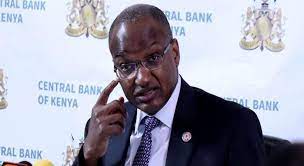CBK Raise Benchmark Lending Rate to 8.25%, Increasing Loan Rates, The CBK has increased the CBR, or benchmark lending rate, to 8.25% from 7.50%, which will have a significant impact on the cost of loans.
On Thursday, the Central Bank of Kenya (CBK) announced a 0.75 percent rate hike to help mitigate rising domestic and international inflation risks.
According to the Central Bank of Kenya’s (CBK) post-Monetary Policy Committee press release, “overall inflation is expected to remain elevated in the near term” because of “the scaling down of the government price support measures,” which led to increases in fuel and electricity prices, as well as the impact of tax measures in the 2022/23 budget and global inflationary pressures.
The Committee recognized persistent inflationary pressures, heightened global risks, and their potential impact on the domestic economy, and reached the conclusion that monetary policy could be tightened to better anchor inflation expectations.
The Central Bank of Kenya (CBK) plans to increase the benchmark lending rate in an effort to stifle inflation by cutting off the supply of money (demand) and encouraging investments in Shilling denominated assets following large portfolio outflows caused by interest rate hikes in developed economies.
For instance, analysts advocating for a rate hike at the September meeting argued that doing so would encourage domestic investments, which would in turn reduce the burden on the local currency’s value.
However, those who argue that interest rates should remain low have raised concerns about the impact of higher borrowing costs on both Kenyans and the government.
Even before the CBK raised its benchmark lending rate by 0.5 percentage points in May, average lending rates and short-term domestic debt interest rates were on the rise.
According to CBK statistics, for example, the average lending rate at commercial banks increased from 12.22% in May to 12.35% in July, reflecting the higher cost of borrowing.
In the meantime, Treasury bill yields have increased by 0.4% to 0.9% in the first half of 2022 to reflect the higher interest rates.
Despite rising interest rates, private sector credit growth has held steady at 12.5% in August, up from 12.3% in June and a slight slowing in July.
Non-performing loans (NPLs) as a percentage of total loans made by banks fell to 14.2% in August from a June high of 14.7 %.
The construction, manufacturing, transportation, and communication industries have all reported repayments and recoveries. Furthermore, CBK remarked that banks have continued to set aside sufficient funds to cover nonperforming loans.
CBK reports that its survey of CEOs and the private sector market reveals “stronger” optimism about business activity and economic growth prospects for 2022, despite elevated inflation risks.
CBK attributed the upbeat outlook to post-election business activity, the expectation of new government policies, and the general feeling of optimism among investors.
Similar moves by the Federal Reserve and the European Central Bank have prompted the CBK to increase its benchmark lending rate (ECB).

